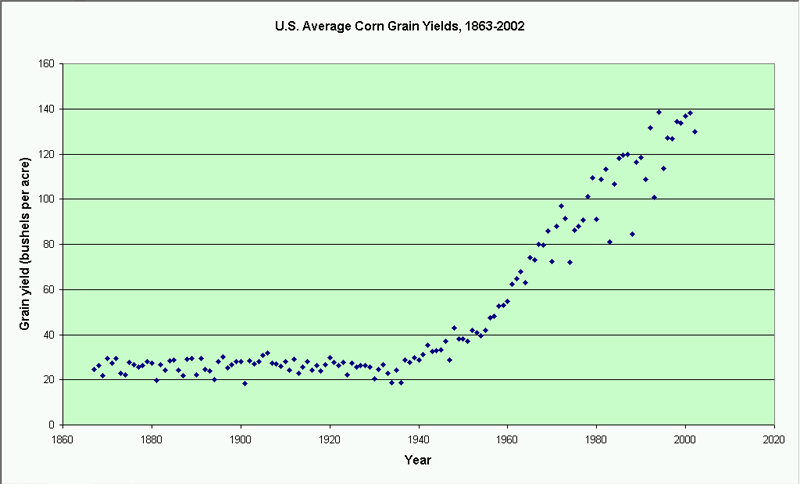The population of the world continues to increase. Poverty rates continue to decrease, and the demand for food continues to increase. With affluence, people eat more meat, and the demand for feed goes up. Consequently food grain and feed grain production has increased and will have to continue increasing.
 |
| Source: Corn Grain Yields |
I posted several weeks ago on a biography of Henry Wallace. He was very important in the improvement of agricultural productivity in the United States. Notably, he promoted hybridization of corn and was a founder of Pioneer Hi-bred, the firm that pioneered in the hybrid seed industry,
As Zvi Griliches demonstrated in a classic paper, hybrid corn began to be grown widely in Iowa in the 1930s, and spread through the corn belt and into other regions of the country in later years. The increased yields shown in the graph shown above are the result of the improved varieties, plus use of fertilizers to maintain soil fertility, more use of better pesticides, and better farming practices. More recently, genetically modified varieties have helped to continue the improvement of corn crops.
I would note that a quirk in the genetics of hybrid corn in the United States made it susceptible to a variety of blight that spread rapidly and destructively in the late 1960s and early 1970s, leading to significant reductions in yield over portions of the geographic area devoted to corn production.
This is an example of the improvement in crop varieties and farming practice that have kept grain prices low in the face of increasing demand.
2 comments:
World Food Prize goes to 3 biotech scientists
"Many U.S. farmers credited genetic modifications in corn with saving last year's crop from all but total devastation as half of the nation endured the worst drought in 60 years. Modern corn plants are more stable and can withstand a wider variety of climate conditions because of genetically improved leaves, roots and reproductive capability."
GM crops are safer than conventional crops, says Environment Secretary Owen Paterson
"In the most comprehensive analysis of the risks of GM foods, the European Commission examined 130 research projects carried out by 500 groups over 25 years. In December 2010, the EC concluded there is 'no scientific evidence associating genetically modified organisms with higher risks for the environment or food and feed safety than conventional plants or organisms'"
Post a Comment